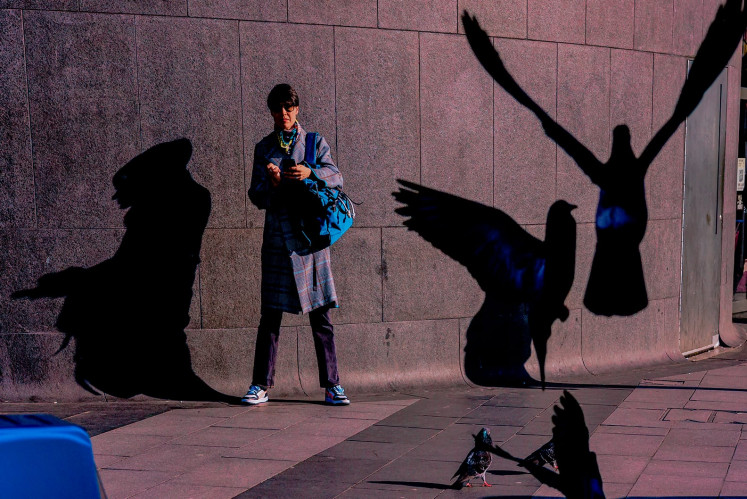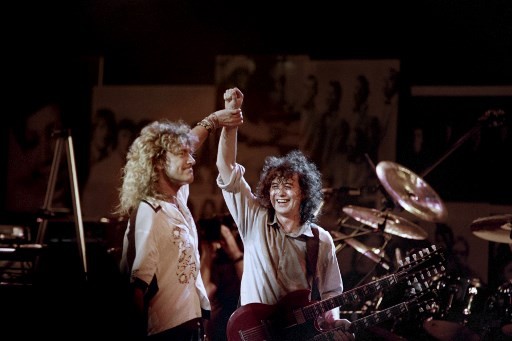In storm-hit Dominica, Creole music offers uplift
Change text size
Gift Premium Articles
to Anyone
 Dominican group Muzik a Nou on stage at the national stadium, Roseau, October 28, 2018 in Roseau, Dominica. (AFP/Gemma Handy)
Dominican group Muzik a Nou on stage at the national stadium, Roseau, October 28, 2018 in Roseau, Dominica. (AFP/Gemma Handy)
A
mid the kaleidoscope of colors of Dominica's capital Roseau, the streets pulsated with the sounds of African drums and steelpans, bamboo "boom pipes" and accordions.
Impromptu parties sprung up on roadsides and beaches for the weekend of revelry that is the World Creole Music Festival, a chance to showcase the origins of the now global but intrinsically Caribbean sound.
The 20th edition of the festival brought thousands from across the Caribbean to the tiny island nation and sent a message that Dominica has moved on from Hurricane Maria, which last year claimed dozens of lives here as it obliterated homes and livelihoods.
Creole music has its roots in Africa, from which most of the region's slave populations originated.
Today, both feet are firmly in the Caribbean and the music comprises a rich potpourri of buoyant beats, catchy melodies and uplifting lyrics.
Headline acts for the festival in late October included Grammy-nominated Jamaican reggae singer Chronixx, Trinidadian soca star Machel Montano and former Haitian president and musician Michel Martelly, who performed under his stage name Sweet Micky in a lively set laced with humor and political commentary.
First Serenade, an 11-piece Dominican band that started off playing in a church in the 1980s, reunited for the festival after losing their instruments in the hurricane, which ravaged much of the Caribbean.
"I love the fusion of the music and the way it's evolved over the years. These days, we use drums, keyboards, trumpets, trombones and sax," trombonist Christopher Dangleben said.
"Creole music is our national identity and our lyrics promote peace, humanity and our island."
Read also: Indos pioneers of Dutch pop music
- Age-old styles, global audience -
Like the Caribbean, Creole music is diverse.
The sounds of the islands have increasingly spread around the world -- most notably reggae and soca, but also bachata and reggaeton, taken to wide audiences through immigrant communities and the force of the internet.
In Dominica, Creole music still uses age-old instruments such as conch horns; a large tambourine known as a tambal; the gwaj, which consists of a stick rubbed against a steel grater, and maracas-style shak-shak, typically crafted from coconut shells and beads.
First Serenade plays bouyon -- which roughly translates as "melting pot". It's a blend of a traditional folk style known as jing ping with bele, reminiscent of African fertility dances, as well as reggae and soca.
Veteran musician Derek Peters, who is credited with creating the style -- says it honors both genre-spanning sounds and Dominica's diverse people, whose ancestors include Amerindian Caribs, African slaves and French and British colonizers.
"The reason it has stayed popular is because it includes wider music now like dancehall, R&B and hip-hop," Peters said.
Read also: Celebrating music, Britain to have 'National Album Day'
- 'Each island has its own Creole' -
The World Creole Music Festival was first staged in the late 1990s as a means of showcasing Dominica's local music and culture -- and wooing more tourists to the island, which is only home to about 70,000 people.
This year was all the more important as it came in the run-up to the 40th anniversary of independence on November 3.
Thousands attended each night of the three-day event, festival organizer Marva Williams said.
"We still have a lot of work to do in helping the world understand what Creole means. Creole is a way of life and each island has its own Creole based on its history and culture -- how they eat, sleep, dress and communicate," she said.
Caribbean Creole languages were born in the region's slavery-era plantation fields as a means of communicating without slave masters overhearing.
Dominica's indigenous broken French is today woven into its musical fabric, providing commentary on everything from relationships and sex to food and politics.
"Putting the festival together this year was a challenge with lots of hotel rooms not available" because of ongoing repair work in the wake of Maria, Williams admitted.
"But we did a major clean-up so people were not constantly reminded about the hurricane; we invited the world to join us and the atmosphere has been better than ever."
That sentiment of optimism and bacchanalia -– in such stark contrast to the havoc unleashed in September 2017 -– was embodied among the throngs of partygoers on the streets.
"We came out to enjoy life to the max," taxi driver Earl Archibald said. "It's been a big reunion with so many family and friends coming home. I've seen people I haven't seen since high school.”
Gregory Antoine, who was attending the festival for the 15th time, said: "This one is like no other; we have more artists, lots of big names and I have never seen so many people."
For Colin Piper, CEO of the country's tourism authority, "it brings in revenue but we also needed it as a time to relax and exhale while sending the message that Dominica is moving on."









